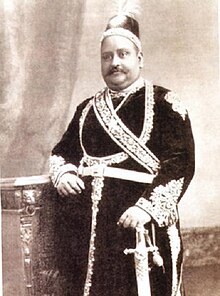| Khwaja Salimullah Bahadur | |
|---|---|
| Nawab of Dhaka Amir al-Muminin | |
 | |
| Nawab of Dhaka | |
| Reign | 1901–1915 |
| Predecessor | Khwaja Ahsanullah |
| Successor | Khwaja Habibullah |
| 1st President of the All-India Muslim League (Interim) | |
| Predecessor | position established |
| Successor | Aga Khan III |
| Born | 7 June 1871 Dacca, Bengal, British India |
| Died | 16 January 1915 (aged 43) Chowringhee, Bengal, British India |
| Burial | Begum Bazaar, Dhaka |
| Spouse | Nawab Begum Asmtunnesa Nawab Begum Alima Bibi Nawab Begum Raushan Akhter Nawab Begum Naznijan Nawab Begum Ayesha Nawab Begum Azizunnesa |
| Issue | Khwaja Habibullah |
| House | Dhaka Nawab Family |
| Father | Khwaja Ahsanullah |
| Mother | Nawab Begum Wahidunnesa |
| Religion | Sunni Islam |
| Military career | |
| Allegiance | Dhaka Nawab Estate |
| Years of service | 1901 - 1915 |
Nawab Sir Khwaja Salimullah Bahadur GCIE KCSI (7 June 1871 – 16 January 1915) was the fourth Nawab of Dhaka and one of the leading Muslim politicians during the British rule in India.[1]
On 30 December 1906, the All-India Muslim League was officially founded at the educational conference held in Dhaka.[2]
The convention was held at Ahsan Manzil, the official residence of the Dhaka Nawab Family. Sir Salimullah was a key patron of education for the Eastern Bengal. He was one of the founders of the University of Dhaka and the prestigious Ahsanullah School of Engineering (now the Bangladesh University of Engineering and Technology).[3][4][2]
Sir Salimullah was a staunch supporter of the Partition of Bengal and was a member of East Bengal and Assam Legislative Council from 1906 to 1907.[2][3]
- ^ Sirajul Islam; Miah, Sajahan; Khanam, Mahfuza; Ahmed, Sabbir, eds. (2012). "Nawab Family of Dhaka". Banglapedia: the National Encyclopedia of Bangladesh (Online ed.). Dhaka, Bangladesh: Banglapedia Trust, Asiatic Society of Bangladesh. ISBN 984-32-0576-6. OCLC 52727562. OL 30677644M. Retrieved 24 November 2024.
- ^ a b c Cite error: The named reference
Cybercitywas invoked but never defined (see the help page). - ^ a b "Khwaja Salimullah". World History. Retrieved 12 January 2012.
- ^ Mamun, Muntasir (1993). Dhaka: Smriti Bismritir Nagari. Dhaka, 1993. ISBN 984-412-104-3.